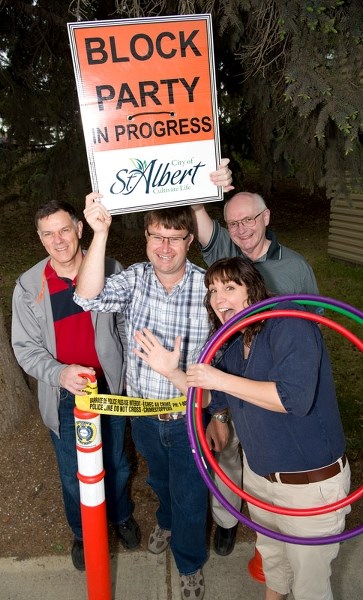City staffers and local churches hope to get a party started on every street in St. Albert by bringing good neighbours together.
About 35 people came out to a block party boot camp Tuesday at St. Albert Place. Many had heard about it through a new initiative called The Good Neighbour Project – a free online service that aims to bring party planners together.
It’s part of the city’s ongoing strategy to build community engagement, explained neighbourhood development co-ordinator Angie Dedrick.
The city started promoting block parties in 2006 due to recommendations from the Task Force on Vandalism and Youth Issues. They’ve now had 537 registered parties since 2008, and set a one-year record last year with 102.
They’re aiming for 150 this year as part of a long-term goal to have a block party on every street, Dedrick said. So far, about one in three of the city’s 696 streets have hosted a block party since 2008.
Dedrick said the idea for the Good Neighbour Project started last year when Matt Garvin, community engagement and mission pastor for the St. Albert Alliance Church, approached her and asked how the church could help promote block parties.
“Right around the same time, I had read a book called The Art of Neighboring,” she said, referring to a book by Dave Runyon and Jay Pathak.
The book described how a group of church leaders in Denver asked the city’s mayor how they could improve the city. The mayor said they could make a huge difference if they helped build a community of good neighbours.
“What struck them was that whole commandment of ‘love thy neighbour.’ Maybe that meant your actual neighbour?” Dedrick said.
The churches teamed up and encouraged their members to build non-denominational relationships with people in their neighbourhoods.
Dedrick and Garvin brought this idea to the St. Albert Christian Ministerial group, which represents many of this city’s churches. The group liked it, and agreed to launch the Good Neighbour Project last month.
Six local churches spent April teaching their congregations about the importance of neighbours using exercises from Runyon and Pathak’s book and promoting block parties, Garvin said.
Many church-goers said that they wanted to host a party but didn’t know how or didn’t have the time, Dedrick said.
That led Dale Fetterly, a member of the city’s Neighbourhood Watch Association (which provides free hot dogs and hamburgers for the city’s block parties), to create a searchable database for party planners as part of the project.
Residents can register their name and contact information on the Good Neighbour website and specify if they want to attend, help with, or organize a block party, he explained. The website then automatically connects people who live on the same street so they can start organizing. It also acts as a one-stop-shop for traffic permits, barricades, sports equipment, and food should you need them for your event.
About 60 people have signed up so far, and several have been paired up for parties, Fetterly said. He’s also had about 25 block parties registered this year – about twice as many as he had this time last year.
Although churches were promoting this project, Fetterly emphasized that the initiative itself was non-denominational.
“It’s not a religious thing.”
Block parties are a great way to improve the safety of a community, Dedrick said. Residents can watch out for suspicious vehicles and open garage doors, and kids know whom to turn to in the event of an emergency.
“When you know your neighbours, you’re going to watch out for each other.”
About 57 per cent of St. Albert block party organizers said they made new connections with neighbours last year through a block party, Dedrick said. About 21 per cent felt safer because of one.
Dedrick said this website could eventually be used to organize other community projects such as Little Free Libraries should it prove popular.
The project’s website is goodneighbourproject.org.




